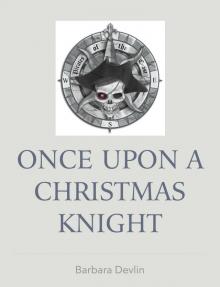- Home
- Barbara Devlin
Arucard (Brethren Origins Book 1) Page 2
Arucard (Brethren Origins Book 1) Read online
Page 2
“Well I like that.” Aristide shuffled his feet. “On the verge of our demise, thou dost think only of thy belly.”
“And that surprises thee?” Geoffrey snickered. “I wager Demetrius expected food fit for a king, not a disgraced and exiled knight.”
“But thou art no longer disgraced or exiled.” At the railing of the second floor gallery, His Majesty inclined his head. “While Philip burned at the stake some fifty-four knights, in May of thirteen-ten, the Vatican Chinon Parchment, issued by Pope Clement V, absolved the Knights Templar and Grand Master de Molay, though he remains a prisoner of France, and we anticipate will suffer the same fate.”
“And what of us?” Peering at his brethren, Arucard compressed his lips, as King Edward strolled to the rear and then descended the stairs. “Art we to be treated thus?”
“Although our French adversary refuses to recognize the Papal Bull Vox in Excelsis, which suspended thy order, or the Ad Providam, which redistributed thy assets to the Hospitalliers, save the fortune thee brought to my shores and so generously donated to my treasury, we would offer a proposal to serve our combined purpose.” His Majesty’s voice echoed on the stone walls of the chapel, as he navigated the aisle. “As thou dost seek to live, and we require warriors of unmatched prowess upon whom we can rely, let us collaborate in noble endeavors. In recompense, we shall reward thee with thy own distinguished order, the benefits of royal favor, and our unadulterated protection.”
The bargain sounded too good to be true, and Arucard raised his defenses and gazed at his brothers. “Given our devout beliefs, if I may beg thy indulgence, what would thee ask of us, Sire?”
“As we recall, Sir Arucard, thou dost shepherd thy men.” The King narrowed his stare. “Thine is a courageous occupation, and we do not envy thee, but at present our needs art simple. We require an oath of loyalty, obedience in all matters of state, and unimpeachable allegiance, but we art not ignorant of thy faith, so we shall bear that in mind when issuing decrees. That is our agreement, else thou mayest retire to thy quarters and spend the remainder of thy days, however many or few that may be, in reflection and solitude.”
Thither was no mistaking the veiled threat, and for a few minutes, Arucard searched his mind for a response. Were his choice limited to his future, alone, he would answer without delay, as he would rather die with his soul intact than risk eternal damnation for a prolonged existence of comfort and prestige he neither demanded nor desired. But he could not ignore his crew and the consequences his response might mete upon them, so he would gladly sacrifice himself to keep them safe from harm. With his course determined, he studied his friends for any sign of reluctance, and each conveyed their acceptance in a nod of affirmation.
“Well, then.” With a fist pressed to his chest, Arucard knelt, his kindred followed suit, and so it was done. “On our honor, we art at thy command, Majesty.”
“Given thy reputation, which precedes thee, absent Philip’s attack on thy character, we take thy word as thy oath.” In that second, the King unsheathed an impressive sword, which he tapped to each man’s shoulders. “Then arise most virtuous knights of the Order of the Brethren of the Coast.”
“The Brethren of the Coast?” With a grimace, Geoffrey quirked his brows. “Never have I heard of them.”
“That is because we created the appointment to accommodate our new men-at-arms.” Edward waved to his minion, who carried a tray draped in blue velvet, which the King drew back with a flick of his wrist. “The official seal of thy occupation, for our Nautionnier Knights. Thine ships remain whither thee docked them, and we have seen to their care, as we engender immediate departure, following a ceremony of some importance to solidify our ties.”
“Gramercy.” Arucard studied the heavy gold object and frowned, as it struck him as garish for a humble servant. “Thou art most kind, Sire.”
“See to their comfort in chambers befitting their station,” His Majesty stated to the attendant. “As we have a private matter to discuss with Sir Arucard.”
Now that caught his attention, and he gulped. Was it not enough that he would surrender his life for the Crown? When the King ushered Arucard to a side room, he halted before a small table, upon which sat a crystal decanter and goblets. After pouring two portions of wine, Edward turned. “May we offer thee a refreshment? As we believe thou wilt need it.”
“Gramercy, Majesty.” With quivering fingers, he grasped the stem, as his thoughts ran amok. What more could the King want? “To what shall we toast?”
“Thy wedding.”
#
It was a brisk fall morning in London, and the wind whispered and thrummed in the trees, casting a shower of leaves on the path, as Isolde de Tyreswelle shivered beneath her threadbare wool cloak and filled two buckets with water from the well. Balancing the shoulder yoke, she huffed and puffed, as she carried the load into the undercroft of her family’s town dwelling and struggled with the weight as she shuffled into the scullery.
“Lady Isolde, thou art not a maid.” After wiping her hands on her apron, Margery, who worked as a steward, of sorts, folded her arms and frowned. “Thy mother, God rest her, would be furious with thy father, as he has not done right by thee.”
“And thou wilt tell him that?” she inquired, with a grimace at the prospect.
“To see thee suffer the consequences of my forthrightness?” Margery scoffed. “Not on thy life. Yet I would not permit thee to toil as a commoner, when thou art of noble blood.”
“But he ordered a bath, and I dare not tarry, else he will not hesitate to spill my noble blood.” With a grunt, she hoisted the pail to a pot for boiling. “Thou dost know well his temper.”
“Let Anne do it.” Margery wrinkled her nose. “Oh, whither is that daggle-tailed girl? Anne?”
“Didst thou call me, ma’am?” With a wide-eyed expression, the timid servant, wearing more cinder soot than clothing, curtseyed, and Isolde bit back a rebuke. “Lady Isolde, that is my responsibility.”
“Sorry, Anne.” Pondering her father’s strange mood, Isolde yielded the chore with reluctance, as she had no reason not to return to her chamber, and she rued a chance encounter with her sire. “Then I should leave thee to it.”
Mustering a smile, she nodded and walked into the kitchen, whither the cook plucked a whole chicken. Whistling a frisky little ditty, Isolde strolled through the central hall, ensured the table had been cleared and cleaned, adjusted a couple of chairs with precision, and then continued to her private apartment, which functioned as her sanctuary.
So many times, she had considered running away, but whither could she go? Despite her impressive connections, no one would have sheltered a fleeing female, given the law had defined her as the earl of Rochester’s property. And her lone attempt to escape, which she had ventured a few years ago, had resulted in the abrupt dismissal of a beloved nanny and a sound beating Isolde would never forget.
Breathing a sigh of relief, as she had nary a glimpse or signal of her father, she hurried to her room. After closing the door, she turned—and shrieked.
“What is wrong with thee, chitty-face?” The lord of the manor scowled, and she raised her guard.
“Father, my apologies.” With a bow of her head, she averted her stare, as he did not like her to look at him. And on the rare occasion she forgot his peculiar edict, he reminded her in his favorite manner. “I supervised the preparations for thy bath, and—”
“Not my bath, thou stupid girl.” As he neared, she could not stop shaking. When he grabbed her chin and brought her gaze to his, she swallowed hard as he scrutinized her. “Wash, and make thyself respectable, as I may finally have found some use for thee. Thither art new clothes, which thou art to wear tomorrow, for a very special occasion, which His Majesty has seen fit to bestow upon thy unworthy hide. And if thou dost embarrass this house and disappoint the King, thou wilt not live past the sunset. Dost thou understand?”
“Aye, Father.” Trembling uncontrollably, she digested his proclamati
on. In that instant, she noticed a sapphire blue gown draped over the footboard. Made of sumptuous velvet, with gold embroidery and piping on the sleeves, bodice, and skirt, pearls dotted the neckline of the elegant frock. It was the finest, loveliest garment she had been given. “How should I—”
“Thou art not to ask questions, as I owe thee no answers.” The force of his blow to her cheek rendered her unsteady, and in agony she fell to the stone floor. “Do as I tell thee and naught more, else I wilt cut out thy tongue, and thy future husband wilt, no doubt, thank me.”
“My future husband?” Dazed and confused, she spoke before she realized she had opened her mouth, which she clamped shut, and the bitterness of blood pooled in her throat and almost gagged her, as she crawled to the four-poster and dragged herself to sit atop the mattress.
“Indeed, thou art to marry.” Perched in her reading chair, the man who gave her life, and then resented the very deed that resulted in his wife’s death, stared at her with unveiled contempt, and she shuddered in fear. Didst he not know she would gladly trade places with her mother? “Edward wishes to garrison troops on the lands that border ours, and he seeks an alliance through thy union with one of his knights, to solidify the Sovereign’s authority. I know naught of the man, and neither do I care, as thou shalt be his burden, and I wilt at last be rid of thee. My only concern is the power and prestige my heir shall enjoy from the connection, as William is to be made an earl, in his own right. What say thee?”
“What pleases thou pleases me, Father.” Was it possible? Could someone want her? Tracing the pattern on the damask coverlet, she dared not object, but what a revelation. Indeed, fortune smiled upon her, and it could not have happened soon enough, because Isolde believed he would eventually kill her in a drunken rage, which occurred with far greater frequency as the years passed. “And I am most happy for my brother.”
“Art thou?” With a countenance of sadness, which surprised her, he toyed with his signet ring. “Often I have wondered how our lives would have been different, had thy mother survived thy birth.”
“Really?” Shocked by his unusual candor, as he never spoke of her mother, and starved for a kind word from him, Isolde dropped her defenses. “So have I. What was she like?”
“Custancia was the most beautiful woman in all of Rochester.” Father stared at the floor and sighed. “As thou can imagine, she was quite sought after, too. For some reason I could never fathom she chose me as her husband, and our parents negotiated our betrothal. When she bore my heir, I was never prouder of her. Indeed, she was the heart of our family, and hers was a great loss.”
“Everyone says she was a very fine lady.” And so many of those same persons declared Isolde the exact personification of her mother, which provided a shred of comfort in solitude. Lost in the moment, she gazed at her father and smiled. “How I wish I could have known her.”
From the earliest years she could recollect as a young girl, she had conjured visions of her mother, always extending support and solace during the harsh reality of Isolde’s precarious existence. With only her father and brother as kin, she had tried and failed to form spiritual bonds with those who should champion and protect her. Instead, her sibling had become her worst tormentor, second only to her sire. But perchance they had finally forged a connection, however late, and she should rejoice.
“I see her in thee.” For a scarce second, he studied her with a softness she had never glimpsed in him. Then his posture stiffened, his expression sobered, and she quivered, as she knew well what would happen next. “Thou art the reason she is gone.” When he stood and unhooked his belt, Isolde’s spirits plummeted. “Now take off thy tunic, kneel on the floor, and let me give thee a wedding gift, that thou might remember me after thou hast departed this house and art no longer subject to my control.”
#
So much had changed in so little time, and in some ways his tiny stone cell had offered a measure of security he now lacked. In one minute, Arucard was locked in White Tower and a prisoner of the King, and thither was no uncertainty in the four stone walls that defined his world, as well as his limitations. In the next instant, he wore the insignia of a knight of the realm, he enjoyed the Crown’s favor, and he was betrothed, and thither was naught certain about any of the accompanying responsibilities, as freedom could be a double-edged sword. It was the last aspect of his newfound status that gave him the most concern and left him wondering if it might have been easier to burn at the stake, because he bore a specific stigma as a cross, and he knew not how to resolve the flaw in his character prior to his wedding.
Telling himself thither was naught wrong with a thirty-two-year-old-virgin, Arucard decided he had no worries—unless, of course, he was the virgin in question. As a Templar Knight, he had no interest in or use for women. In fact, he had taken a vow of celibacy on the same day he joined the order, because only the most chaste knights could ascend to the glorious hereafter. But the Templars were no more, and his tenuous position in England necessitated a marriage to protect those for whom he was accountable and to prove his loyalty to King Edward.
And as he suspected, it had been five years since he fled the Continent with his fellow warriors of the Crusades. Five years since the Templars had been hunted, tortured, and killed during Philip the Fair’s Inquisition. Of an estimated two thousand knights, only five persisted, as far as he knew. Five Templar mariners—all remained wanted men by the king of France.
The mantle in his grasp bore the familiar red cross centered on a field of white and matched the modest, unadorned cloak that was the standard attire of his once great knighthood. How he had worn the uniform with pride, how he had cared for the pristine fabric as though it were a second skin. In a sense, it had been a part of him, a part of his identity, every bit as much as his own flesh. Yet it could define him no longer. With a flick of his wrist, he sent the garb to join the other clothing that burned brightly in the fire.
After a healthy gulp of ale, which he needed, he studied the badge of the Brethren of the Coast, the fledgling order formed by his new master, a price paid to accommodate the fighting men without a home. The seal, fashioned of gold, featured a wind-star design, a large blue diamond at the center, and the Latin phrase Nulli Secundus, Second to None, as was their motto.
The bejeweled piece was similar to his current uniform in its splendor. His fur-lined cloak and rich blue mantle festooned, haphazardly, with gold braids violated the tenets by which he had long existed. As a Templar, he had been taught that unnecessary excess led to immorality. While he understood that his survival in a foreign land, his allegiance to a foreign king, and his union to a creature, who for all intents and purposes was foreign to him outside the maternal realm, required equally foreign customs, he kept his hair cut short and his face clean-shaven, true to his Templar ascendants. And despite the King’s generosity, Arucard much preferred the simple, understated clothes.
“I found it,” Demetrius stated proudly, as he pulled up a crude wooden stool and sat before the fire, whither the men gathered to toast—or rather roast Arucard’s impending nuptials. “My grandsire wrote an oath when first he entered the military, and I am certain it is contained within these pages.”
“What is so important about an old oath, brother?” Geoffrey shifted his weight, as he peered at the antiquated log.
“History,” Morgan responded as he neared. “We art the last of our generation and the first of our kind. Never again will the Knights Templar sail as Templars, but neither will we sail quietly into the night, shrouded in deceit and disgrace. We shall live on as the Brethren of the Coast.”
“Precisely.” With a snicker, Aristide clutched a pitcher and refilled the goblets. “And we must never forget from whence we came.”
“Especially as we face the future.” Given fate posed a far more dangerous prospect than his past, Arucard lifted his chin and sighed. “And all of its uncertainties.”
“When dost thou wed?” Morgan made a pitiful attempt at concealin
g a smile, and Arucard had the sudden urge to punch him in the nose, as his brothers found sport in his predicament.
“Tomorrow,” Arucard replied, as a chill settled in his chest, and he fought nausea. “In the morrow.”
“So soon?” Geoffrey rolled his eyes and whistled in monotone. “Hast thou seen her?”
How had he known to expect that particular query? Arucard shook his head. “I have not.”
“Thine is a precarious situation, brother.” After flicking through the pages, Demetrius abandoned his search momentarily and raised his goblet. “Better thee than I.”
With a grin, Aristide ventured to ask, “Dost thou, perchance, know her name?”
“Isolde,” Arucard replied with a shuffle of his feet. “She is the daughter of a nobleman, or some such.”
“Oh, no. Not a pampered princess.” Unaware that he had just voiced Arucard’s chief concerns, Morgan frowned. “As it is safe to assume she has not seen thee, let us hope she has a sense of humor.”
“Let us hope she can cook,” Geoffrey said, as he tore a piece of bread from a loaf. “As we art at thy command, and Demetrius has quite the appetite.”
“Let us hope she is fair,” Arucard corrected. “Else all shall be for naught, for I will sail to the end of the Earth to escape her.”
His response garnered a chorus of laughter, and, for a scarce second, Arucard’s spirits lightened. Yet the fact remained he was trapped in an arranged marriage he neither wanted nor welcomed.
“How many babes dost thou intend to get on her?” Oblivious to the discord he had just wrought, Demetrius flipped through the torn pages of the mangled tome. “Five or six?”
“Babes?” And so Arucard returned to the plight foremost on his mind, as he swallowed hard. Before he could beget children, he had to learn how to copulate. While he was not ignorant of the physical requirements involved in the primitive act, he had no clue how to please a woman, and London was filled with dissatisfied ladies, as evidence by the unwanted attention he garnered during dinner at court. “I-I have given it no thought.”

 Pirates of Britannia Boxed Set Volume One: A Collection of Pirate Romance Tales
Pirates of Britannia Boxed Set Volume One: A Collection of Pirate Romance Tales A Very Brethren Christmas (Brethren of the Coast Book 10)
A Very Brethren Christmas (Brethren of the Coast Book 10) Brethren of the Coast Box Set 2
Brethren of the Coast Box Set 2 Hold Me, Thrill Me, Kiss Me: A Brethren of the Coast Novella
Hold Me, Thrill Me, Kiss Me: A Brethren of the Coast Novella The Reaper (Pirates of the Coast Book 8)
The Reaper (Pirates of the Coast Book 8) The Stablemaster's Daughter (Regency Rendezvous Book 11)
The Stablemaster's Daughter (Regency Rendezvous Book 11) World of De Wolfe Pack_The Big Bad De Wolfe
World of De Wolfe Pack_The Big Bad De Wolfe The Duke Wears Nada
The Duke Wears Nada The Iron Corsair (Pirates of the Coast Book 2)
The Iron Corsair (Pirates of the Coast Book 2) The Buccaneer
The Buccaneer Hold Me, Thrill Me, Kiss Me
Hold Me, Thrill Me, Kiss Me The Reaper
The Reaper The Blood Reaver
The Blood Reaver Morgan (Brethren Origins Book 4)
Morgan (Brethren Origins Book 4) Love With an Improper Stranger
Love With an Improper Stranger The Blood Reaver (Pirates of Britannia Book 6)
The Blood Reaver (Pirates of Britannia Book 6) Tall, Dark & De Wolfe
Tall, Dark & De Wolfe World of de Wolfe Pack: Lone Wolfe (Kindle Worlds Novella) (Heirs of Titus De Wolfe Book 1)
World of de Wolfe Pack: Lone Wolfe (Kindle Worlds Novella) (Heirs of Titus De Wolfe Book 1) The Black Morass (Pirates of the Coast Book 1)
The Black Morass (Pirates of the Coast Book 1) A Jewel In Time; A Sultry Sisters Anthology
A Jewel In Time; A Sultry Sisters Anthology The Marooner
The Marooner The Iron Corsair
The Iron Corsair The Most Unlikely Lady
The Most Unlikely Lady One-Knight Stand
One-Knight Stand Arucard (Brethren Origins Book 1)
Arucard (Brethren Origins Book 1) Once Upon a Christmas Knight
Once Upon a Christmas Knight Demetrius (Brethren Origins Book 2)
Demetrius (Brethren Origins Book 2) The Buccaneer (Pirates of the Coast)
The Buccaneer (Pirates of the Coast) The Marooner (Pirates of the Coast Book 3)
The Marooner (Pirates of the Coast Book 3) World of De Wolfe Pack: The Big Bad De Wolfe (Kindle Worlds Novella) (Heirs of Titus De Wolfe Book 2)
World of De Wolfe Pack: The Big Bad De Wolfe (Kindle Worlds Novella) (Heirs of Titus De Wolfe Book 2) Tall, Dark, and Medieval
Tall, Dark, and Medieval My Lady, The Spy
My Lady, The Spy The Lucky One (Brethren Of The Coast #6)
The Lucky One (Brethren Of The Coast #6) Captain Of Her Heart
Captain Of Her Heart World of De Wolfe Pack_Tall, Dark & De Wolfe
World of De Wolfe Pack_Tall, Dark & De Wolfe World of De Wolfe Pack: Tall, Dark & De Wolfe (Kindle Worlds Novella) (Heirs of Titus De Wolfe Book 3)
World of De Wolfe Pack: Tall, Dark & De Wolfe (Kindle Worlds Novella) (Heirs of Titus De Wolfe Book 3) To Catch A Fallen Spy (Brethren of the Coast Book 8)
To Catch A Fallen Spy (Brethren of the Coast Book 8) Lone Wolfe
Lone Wolfe